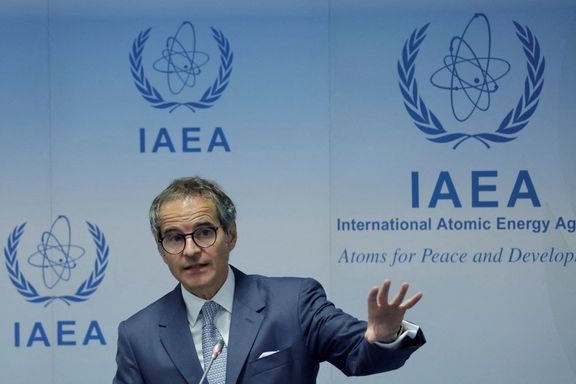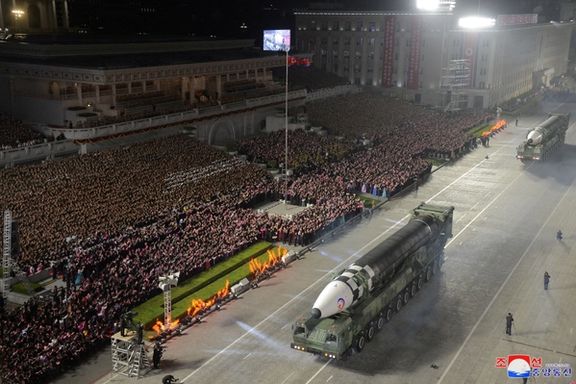UN Nuclear Watchdog Warns Of Iran Becoming Another North Korea

The UN nuclear watchdog warns the future of Iran's nuclear program could mirror the path taken by North Korea, characterized by secrecy and no international oversight.

The UN nuclear watchdog warns the future of Iran's nuclear program could mirror the path taken by North Korea, characterized by secrecy and no international oversight.
Rafael Grossi, the Chief of the International Atomic Energy Agency (IAEA), stated on Monday that the world must not repeat the mistakes it made with North Korea, where IAEA inspectors were expelled in 2009, leading to the development of nuclear weapons.
The IAEA has had no access to the country since 2009 and has been monitoring its nuclear advancements from a distance, mainly through satellite imagery. While the agency maintains access to Iran's declared nuclear facilities, the recent expulsion of around one third of its inspectors by the Islamic Republic has raised major concerns.
Furthermore, the erosion of the 2015 nuclear deal between Tehran and major powers over the past five years has resulted in the removal of additional monitoring equipment, as requested by Iran. This has also prevented the IAEA from conducting snap inspections at undeclared sites.
Rafael Grossi, addressing an annual US State Department arms control conference via a recorded message, emphasized the critical role of the IAEA as the international community's eyes and ears in Iran. He expressed deep concerns about Iran's nuclear program and stressed the necessity of all possible efforts to prevent a situation similar to that of North Korea.

"We have to deploy every effort to prevent this problem, this current debate on what is happening and what can be done in Iran [from] becoming a failure on the part of the international community to prevent a country that has capabilities which could potentially lead to the development of nuclear weapons from doing it," he noted.
In September, Iran revoked the designation of several inspectors responsible for verification activities under the Non-Proliferation Treaty Safeguards Agreement. Grossi strongly condemned Iran's "disproportionate and unprecedented unilateral" decision, acknowledging it as a step in the wrong direction and an unnecessary strain on the relationship between the IAEA and Iran in the implementation of the NPT Safeguards Agreement.
Grossi's recent quarterly reports on Iran revealed that the Islamic Republic has now enriched enough uranium to approximately 60% purity, for several nuclear warheads. That stockpile can be further enriched to the roughly 90% required for weapons-grade material in a matter of a few weeks, making Iran a 'nuclear threshold state..
The agency is currently facing various standoffs with Iran, including disputes over identifying the origin of uranium particles found at two undeclared sites, the reinstallation of monitoring equipment that has been removed, and Iran's recent "de-designation" of IAEA inspectors.
Iran is has expanded its program significantly since 2018 when the United States unilaterally withdrew from the Iran nuclear deal – or Joint Comprehensive Plan of Action (JCPOA). Last month, three signatories of the deal, UK, France, Germany (E3) delivered a joint statement at the IAEA Board of Governors meeting in which they condemned Iran’s lack of transparency with regards to its nuclear program.
However, despite their emphasis on Iran’s non-compliance, the E3, much like the US, fell short of introducing measures that would ensure Tehran’s cooperation with the IAEA. On the contrary, just in August, the Biden administration agreed to release $6 billion of Iran’s funds blocked in South Korea due to US sanctions in exchange for five US citizens held hostage in Tehran.
In January, IAEA inspectors at Fordow detected undeclared centrifuge configuration changes as well as particles of uranium enriched up to 83.7%. When Grossi visited in March, he brought back an agreement that was hailed as a breakthrough by both sides but deemed insufficient and non-binding by its critics.
Seven months on, the premise seems to have been shaky at best. According to the IAEA, Iran has accumulated enriched uranium (5-60%) far beyond JCPOA limits that was hailed as a breakthrough by both sides but deemed insufficient and non-binding by its critics. Iran continues enrichment in Fordow, where inspectors detected undeclared particles of uranium enriched at 83.7%.